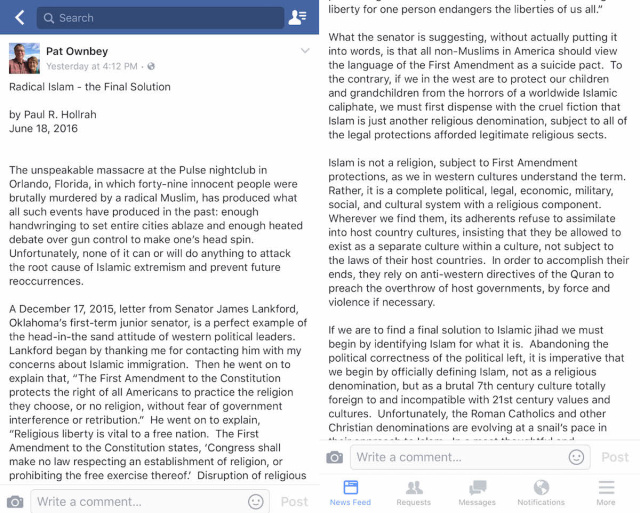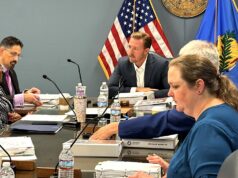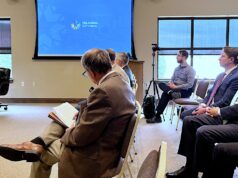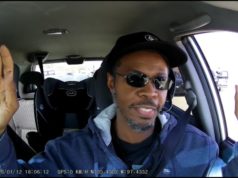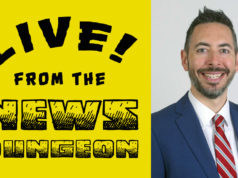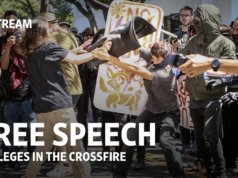Sometimes, a yes-or-no question is best answered with a simple yes or no.
But in an interview Monday, Oklahoma Rep. Pat Ownbey (R-Ardmore) refrained from casting an up or down vote in response to what I thought would be a simple inquiry: “Do you think Islam is a religion that should have First Amendment protections?”
Instead, Ownbey opened his reply with a complex grunt of thoughtful consideration.
“That’s an interesting question,” he said. “Frankly, I haven’t done the studying on the Islamic religion to know everything there is to know about it, so to speak at it from an expert opinion would not be right for me to give you a particular opinion, unless I was jumping in there and doing a lot of research on it.”
Oh boy. Buckle your seat belts.
I had called Ownbey less than 24 hours after he had posted a local writer’s lengthy Facebook essay that, among other things, stated “Islam is not a religion.”
Titled Radical Islam — the Final Solution and attributed to Paul Hollrah, the 1,600-word screed compares Islam to other religions and examines statements from multiple Popes on the topic.
Near its end, the author concludes:
And since our political leaders appear unwilling to do what is necessary to protect us, we cannot escape the possibility that We the People may ultimately be forced to take matters into our own hands.
Since he is a political leader, I called Ownbey to discuss the piece. He described it as “a good article” and thought “it had interesting opinions.”
“When I post a lot of these things, I don’t necessarily agree with everything I post, but I post to get feedback,” he said. “That was the reason I posted that.”
Who is Paul Hollrah, and what did he write?
Hollrah’s LinkedIn profile lists him as a “contributing editor” for the National Writers Syndicate and a former national lobbyist for the gas station Sunoco.
His essay opens with a reference to the Orlando shooting and how “49 innocent people were brutally murdered by a radical Muslim.”
Hollrah chastises U.S. Sen. James Lankford for saying the First Amendment of the U.S. Constitution guarantees people’s freedom of (and freedom from) religion. Then, the northeastern Oklahoma writer makes a grand contention that Muslims should not be granted the First Amendment’s religious protections:
To the contrary, if we in the west are to protect our children and grandchildren from the horrors of a worldwide Islamic caliphate, we must first dispense with the cruel fiction that Islam is just another religious denomination, subject to all of the legal protections afforded legitimate religious sects.
Islam is not a religion, subject to First Amendment protections, as we in western cultures understand the term. Rather, it is a complete political, legal, economic, military, social, and cultural system with a religious component. Wherever we find them, its adherents refuse to assimilate into host country cultures, insisting that they be allowed to exist as a separate culture within a culture, not subject to the laws of their host countries. In order to accomplish their ends, they rely on anti-western directives of the Quran to preach the overthrow of host governments, by force and violence if necessary.
When I called Ownbey to discuss this idea that “Islam is not a religion” worthy of First Amendment protection, the representative said he had received no negative feedback on his post.
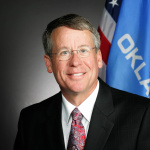
“I do believe there’s a lot of issues with the Muslim religion that are concerning to Americans and certainly are concerning to Oklahomans,” Ownbey said. “And one of them, particularly, just has to do with the fact that we don’t see too many Muslims standing up and condemning what’s happened like in Orlando.”
The former radio station owner doubled down on that assertion and posed it back to me in the form of a question.
“Why aren’t we seeing more of the condemnation from Muslims across the United States and across the world?” he asked rhetorically.
I didn’t know what to tell him. I had seen a statement of condemnation from Oklahoma Muslim leaders, condemnation from Muslims around the world and even a video of 200 New York Muslims praying together for Orlando victims only a few hours after the attack:
I asked Ownbey whether he knew there is a mosque in his southern Oklahoma town. He asked someone in the car with him, “Is there?” before saying, “I guess there is. Again, I haven’t heard anything from not just the Muslims in Ardmore but from the Muslims across the state.”
Ownbey — a Christian who was re-elected to a fifth term by default in April when he drew no challengers for the second election in a row — said that if people claiming allegiance to his religion were committing heinous acts, he would be taking a vocal stand against them.
“I don’t think it’s necessarily my job as somebody who’s outside the Muslim religion to try to go in and bring them out,” he said.
I knew he meant that it wasn’t his job as a Christian bystander, but I asked whether he thought it might be his job as a state representative.
“That’s a good question, and frankly, I don’t know,” Ownbey said. “I don’t know what to say there. I’m thinking from other churches across the county that people have trouble with — or maybe someone’s concerned about something — is it my job as state representative to go to those churches and try to bring out harmony amongst all the other churches? I would say no, so I guess it just depends on the situation.”
‘For one thing, you wouldn’t be killing anyone during Ramadan’
I had called Ownbey because the logical fallacies in Hollrah’s essay are enormous, and they can be boiled down to a simple concept: If Americans respond to ISIS by denying First Amendment rights to the millions of peaceful Muslims living in our country, the terrorists literally win.
Without downplaying the threat that radical, militant Islamic groups pose to world peace and safety (watch 60 Minutes’ examination of ISIS’s genocide of the Yezidi in Iraq), Ownbey’s comments showed a concerning lack of dialogue between this prominent state representative and a minority group he represents.
Back to the phone.
In a matter of hours, I had reached three different Muslim men who worship at the Islamic Center of Ardmore. Case in point, not one of the men knew Ownbey by name.
The first, Mujahid Evans, said he travels extensively for work, and he was in Indiana on Monday.
“When I’m in town, I go by the center,” Evans said. “For the first 10 years, I was there on a regular basis.”
Evans said that anyone who thinks the Orlando shooter represents what Islam stands for is mistaken.
RELATED
You don’t have to fear my Muslim friends by Andrew Rice
“I hear people say that guy was Islamic. That’s not the picture that Islam paints,” Evans said. “For one thing, you wouldn’t be killing anybody during Ramadan. There’s no reason to kill anybody at any time, but I’m just saying during Ramadan — when you’re in clubs and drinking, you know — that person may say he’s a Muslim, but that doesn’t mean he’s practicing Islam.”
Hours later, I reached Ardmore salesman Andy Shurbaji, and he offered a similar reaction to violent acts like the Orlando shooting.
“We don’t want this to happen,” said Shurbaji, who was president of the Islamic Society of Ardmore for 17 years. “We have a wonderful relationship (with the people of Ardmore). It’s a very nice town to live in. We have nothing to say but good stuff.”
Still, Shurbaji said more dialogue is needed, such as open houses that Islamic groups have held in other Oklahoma communities.
“There should be some kind of integration, but how can you push yourself on people?” he pondered. “(One time) we invited some churches and stuff like this. Some people from churches came. Some churches didn’t want to come. So it’s not easy to push yourself on people. Unfortunately, with all this negativity — back then it was Sept. 11 — we understand. But I agree there should be more dialogue, more interfaith, if you will.”
Dr. Baha Abu-eheh, a private-practice neurologist, is the acting president of the Islamic Society of Ardmore, and he laid partial blame on media for painting Muslims with too broad a brush.
“Try not to just watch certain channels, try to meet with people,” Abu-eheh said. “Once people start dealing with Muslims, they change their minds. They can discover that the media has been conveying a wrong message of what Islam is truly about.”
Evans, Shurbaji and Abu-eheh each said Islam is about peace, and they criticized those promoting violence in the name of the religion.
“It’s an awful feeling when you see people conveying the completely wrong position of Islam on things,” said Abu-eheh, who was born in Kuwait. “We shouldn’t generalize. If somebody bad did it under the name of Christianity, Buddhism or Islam, then I presume that the whole religion is like that? This is wrong. This is wrong.”
Make the world a better place
In the end, if a journalist cold-calling three Muslims from Carter County elicits more condemnation of violence than condemnation of the state representative who can’t answer whether Islam should be protected under the First Amendment, perhaps the dozen-or-so Muslim families in town aren’t the problem.
In fact, Abu-eheh and Evans both noted how visiting researchers and scientists at the Samuel Roberts Noble Foundation have attended Ardmore’s mosque over the years. I believe that’s what the Chamber of Commerce crowd likes to call economic development.
So here’s hoping Rep. Ownbey and Dr. Abu-eheh can do lunch, “interfaith” a little and become friends.
Would that make the world a better place?
Short answer: Yes.








